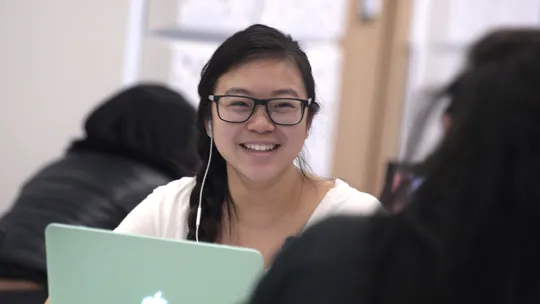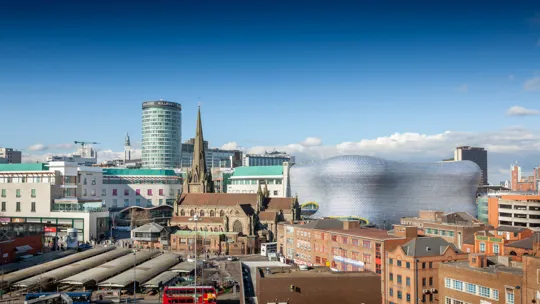Before you travel to Britain
As an international student, you are likely to have to make extra preparations before leaving home and to require additional documentation from University College Birmingham. Please use the checklist below to make sure you are fully prepared.
-
For EU students, make sure you satisfy the conditions of the offer of a place given by University College Birmingham
-
Bring all your original qualification certificates and examination results with you - copies will not be accepted
-
Have a valid passport
-
Obtain any medical certificates you might need
-
Make arrangements for your accommodation and bring your accommodation details with you;
-
Book transport to Birmingham
-
Check the dates for the international student orientation
-
Plan your budget

Non-EU students will usually require a Student Visa
Once you have made your decision to come to University College Birmingham you will need to make final arrangements, which will include, in most cases, obtaining a Student Visa.
You can apply for a visa from overseas within 6 months of your official course start date, and you are advised to do this as early as possible.
Student Visa Confirmation of Acceptance of Studies (CAS)
A CAS is a multidigit number which is required for successful Student Visa applications. This is generated by the University and will be provided to you as part of the Home Office CAS statement after you fully complete your admissions process, including accepting an offer, paying a fee, and passing pre-CAS checks. Please ensure you submit all the documents required as part of your offer and pay the necessary fee as soon as possible, so that CAS can be released in good time.
To gain a Student Visa
You will have to score points against 3 sets of objective criteria with a score of 70 points - 50 points are awarded for the CAS; 10 points for meeting English Language standards; 10 points are awarded for the Maintenance and Funds Test (you will have to show that you have funds to pay the first year of fees plus £10,600) which means that you must be able to demonstrate that you have and have had for a minimum of 28 days £10,600 as well as any outstanding tuition fees for your course. If you have been in the UK for at least 12 months with valid immigration permission you automatically meet the 10 points needed for Maintenance and Fund test and will not have to evidence this amount.
You must also be studying on a full-time course, involving a minimum of 15 hours per week organised daytime study; or a course which includes a work placement element which is no more than 50% of the full course length if the course is at Level 6 (a degree course or higher) or 33% if the full course length if your course is at RQF Levels 3-5.
As your approved education provider for the duration of your study in the UK, University College Birmingham has a number of duties that we are required, by law, to comply with. There are some important points relating to these duties that we would therefore like to remind you of as you prepare for your arrival in the UK.
Once your visa application is approved, you will be informed by e-mail. You will be granted an eVisa (electronic visa), which is a modern type of a UK immigration status which has replaced physical documents (plastic BRP cards).
For international students it is essential that you bring your passport and a valid Share code for your eVisa. More information about how to generate a Share Code can be found on the gov.uk website. https://www.gov.uk/view-prove-immigration-status
We will also need to verify your new address in the UK, so it is important that you complete your online Enrolment before arriving in the UK. The link for the online Enrolment will be emailed to all applicants closer to the term start date.
The UK Immigration authorities also require us to maintain up to date records for students whilst they are enrolled at University College Birmingham and we are asked to report any students whose circumstances alter once they arrive in the country. We are required to report students who:
-
Fail to enrol on the course within the enrolment period;
-
Withdraw, or who are withdrawn by us, from their course;
-
DO not attend their classes as per the timetable;
-
Change their immigration status to another category and therefore their migration sponsor;
-
Transfer to a shorter course or have their length of study shortened;
-
We suspect are breaking the conditions of their permission to stay.
You will also need to keep your CAS statement safe for the duration of your stay in the UK as you may be asked to produce this in the future. As a student on a Student Visa, you will be expected to provide us with all the information we need to meet the duties above and your cooperation would be greatly appreciated.
If you need to extend your visa in the UK, our International Student Advisors in the International Student Centre will be happy to help you.
What you need to bring with you
-
International students who need a student visa should bring evidence of entry qualifications certificates & transcripts (originals), a copy of the CAS statement, and your passport and eVisa Share Code.
-
Eight (8) passport size photographs
-
You will need your passport if you will be seeking part-time employment. For travel overseas from the UK, a valid passport of at least 6 months duration is required. If your course involves an overseas residential trip this is particularly important.
-
If you are travelling to the UK from a country outside the EU and are carrying more than €10,000 (£8,000 in sterling) in cash, a banker's draft or cheque of any kind, you will be required to declare this at Customs.
-
Birth certificate is required for proof of identity and for tuition fee payment requests for EU students.
-
Clothing - The weather in England can be variable from one day to another and you can experience a noticeable climate change in a year. December to February are the coldest months, and occasionally it snows! May usually brings warmer and drier weather. Sometimes summer in the UK is not always hot! One item you might want to pack is an umbrella because the British weather is known for unpredictable rain. Students on campus generally dress informally, but you may want to bring with you something more formal for special events and if you have to do a presentation on your course of studies.
-
Most medications can be purchased over the-counter in chemists or in a pharmacy, but some are available only by prescription in the UK. We suggest that you stock up on any medication you will need during the stay. You may also want to verify the availability of certain drugs in the UK and their equivalent English names. Make sure you put all your medicine in the main luggage and not in your hand luggage as you do not want to have your medication confiscated at Customs.
-
You will find a number of mobile phone stores in the city centre. Before buying mobile phone check the different companies and the billing rates. Consider whether a contract or a ‘pay as you go’ option is suitable for you. Also consider the consequences if you lose your phone – this may mean you owe the mobile phone company a lot of money, in which case you are advised to get insurance. Check which network your friends are using as using the same network may reduce the cost of calls and texts. If you have to sign a contract for a phone you will need proof of your identity and also your address.
-
A laptop will be really useful to you, but, if you do not have one, do not worry as UCB has numerous computers which can be used by students. We even loan out laptops for University work.
-
As used in Bangladesh, Brunei, Cyprus, Ghana, Gambia, Hong Kong, Malaysia, Malta, Mauritius, Nigeria, Pakistan, Saudi Arabia, Singapore and Vietnam amongst many countries, the UK electrical plug has three rectangular blades in a triangular pattern and has an incorporated fuse (usually a 3-amp fuse for smaller appliances such as a computer and a 13-amp one for heavy duty appliances such as heaters). British sockets have shutters on the live and neutral contacts so that foreign objects can’t be introduced into them. If you need an adaptor you are advised to bring these with you, although adaptors can be purchased in UK electrical stores relatively cheaply.
-
You are advised to bring some bedding with you if you are staying in The Maltings, although bedding can be purchased very cheaply in various stores around the city.
Living costs
It is very difficult to advise international students as to the living costs in the UK, since much depends upon the student’s expectations and needs. However, as a guide, we can offer the following estimates of costs over the course of an academic year:
|
Rent (including utility bills) |
£5,600 |
|
Travel |
£600 |
|
Food |
£2,000 |
|
Equipment |
£200 |
|
Laundry |
£200 |
|
Social and Miscellaneous |
£2,000 |
|
Total |
£10,600 |
Important: The Home Office require at least £10,600 to be available to you to spend on your living expenses (excluding tuition fees).
On arrival in the UK - Immigration arrangements
Please let us know when you plan to arrive.
Passport Control
If you travel to Britain by air, you may arrive at one of London’s international airports, Heathrow or Gatwick, or you could arrive at Birmingham International Airport. Either way, try to get a trolley for your luggage - it can be a long walk! However, a small non-refundable charge will be made for their use.
When you go into the airport you will have to show an immigration officer your passport. The officer may ask for additional documentation, so please ensure you have the following ready:
- eVisa Share Code
- CAS Statement
- UCB Offer letter
- TB test certificate (if applicable)
- Bank statement used to obtain a visa
There will be two different queues of people for clearance through passport control. One queue is for European Union passport holders and one is for all others. If you are a non-EU resident please ensure you enter the UK via the manned desk.
Visit The UK Visas and Immigration
Luggage
After passing through passport control you will be able to collect your luggage. Wait for your luggage at the carousel indicating your plane’s flight number and point of origin. If you do not find your luggage you must make enquiries with the airline that you have used. Please contact an official or porter and ask them for directions to register your complaints.
Customs
When you have collected all of your luggage you must pass through Customs. You will have to pass either through the Green Channel (which means you have nothing to declare) or the Red Channel (which means that you have goods to declare). In either channel, the Customs Officer may ask you to open your luggage for checking.
If you are unsure about what you can or cannot bring into the UK, you should check with your local British Embassy or High Commission before your journey. Please note that it is illegal to bring drugs (other than those prescribed by a doctor) or animals into the country. The penalties for attempting to do so are very severe.
Once you have passed through passport control and immigration, you will need to find your way to Birmingham, either directly or via London.
Discover more

International students
Join our global community of more than 1,400 students from over 60 countries. Our international team will help make your application and arrival as smooth as possible.
Read more
Visas and immigration
Once you have made your decision to study at University College Birmingham, you will need to make final arrangements, which are likely to include obtaining a visa.
Read more
Country and territory information
Find details specific to your country and territory, including entry requirements and agent information.
Read more
Living in Birmingham
Vibrant nightlife, booming business, gorgeous green spaces and fantastic connections throughout the UK and the world. Discover Birmingham and all it has to offer.
Read more
Courses
University College Birmingham is home to 7,500 students on a wide range of programmes, from apprenticeships and college courses to degrees and postgraduate qualifications.
Read more